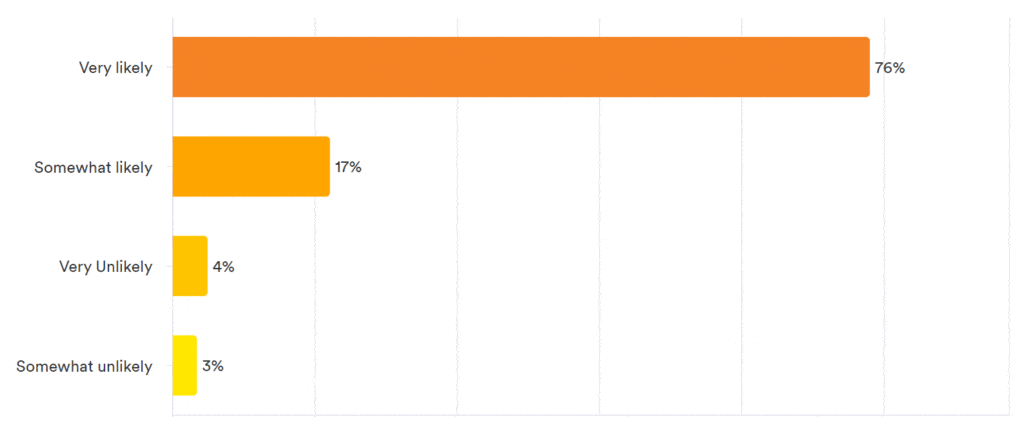The October LANDTHINK Pulse revealed that 76% of respondents are VERY LIKELY to choose owner financing when buying land if it is offered. Owner financing is a type of real estate agreement between buyers and sellers that operates like a mortgage but without a third-party lender. The owner and buyer work out an arrangement to make installment payments directly to the owner as opposed to the bank. The buyer and seller agree on an interest rate for the financed portion, as well as the monthly payment amount, schedule, and other details of the loan. Like a traditional mortgage, owner financing requires legal paperwork, including promissory notes, mortgages, and trust deeds. The paperwork is standard and protects all parties involved in the land transaction.
Last month, the October Pulse asked: If you were buying land, how likely would you be to choose owner financing if it was offered?

One of the leading obstacles when buying land is obtaining financing. Securing financing on unimproved, or raw land with no plans for improvement is typically more difficult than securing a home mortgage. Most land buyers looking to secure a land loan most provide at least 20% down, although it’s not unheard of for lenders to require 50% or more on undeveloped land. A legitimate solution to this problem can be owner financing, and based on last month’s results, potential land buyers are giving owner financing serious consideration.
The beauty of owner financing is its flexibility. Anything is possible when a buyer and seller are both flexible and creative. It is this flexibility that makes owner financing attractive to buyers and sellers. Owner financing is generally safe for buyers, if you make sure it is structured correctly. For the most part, the risks with owner financing fall on the seller.
Owner financed land deals do offer advantages for the buyer. Here are some of them:
Easier Qualification
Owners don’t face nearly as much regulatory scrutiny as traditional lenders do. As a result, owner financing tends to have significantly less stringent qualification criteria than traditional financing. While some sellers may choose to check credit scores and other conditions the same way a bank would, the decision ultimately boils down to the seller’s desire.
Flexible Down Payment Requirement
Depending on the seller and how you negotiate it, you probably don’t need much or any down payments. If the owner does not have a mortgage on the property they will sometimes finance with less than 20% down payment.
Quicker, Simpler and Easier Transaction
The downtime that often comes with loan processing from traditional lenders does not exist in owner financing. The closing process can be much quicker, due to shortened due diligence. Most owner financed land deals will close within 2 weeks of the offer being accepted.
Flexible Loan Terms
If you’re an effective negotiator, you may secure more favorable terms with owner financing than you could otherwise. At the very least, you can negotiate with the seller to structure your financing arrangement in more creative ways to suit your unique situation. Both parties can choose the best repayment option, whether a fixed-rate amortization or an interest-only option. They also get to decide whether or not the interest rate will remain the same or change throughout the loan term.
Lower Closing Costs
Since you are not dealing with a traditional mortgage lender, there are no administration fees, processing fees, or other miscellaneous fees that these institutions charge. Additionally, owners will rarely ask for appraisals, points, flood certifications, title work among other things. Closing costs generally amount to three to six percent of the property’s purchase price so the savings are significant.
Only land owners can offer owner financing, and not many do, so there aren’t strict qualification standards. Owner financing can be beneficial- it all depends on the owner, buyer, and the property. For would-be buyers who are unable to qualify for traditional financing, it’s certainly worth considering. The decision to use owner financing or not depends upon each buyer’s unique financial situation and the terms offered by the owner.
Our informal online survey revealed that 76% of the LANDTHINK audience would be VERY LIKELY to choose owner financing if it was an option, 17% said they would be SOMEWHAT LIKELY. Only 4% said they would be VERY UNLIKELY to use owner financing, and 3% said it was SOMEWHAT UNLIKELY that would choose owner financing.
Do you have a suggestion for next month’s Pulse question? Submit your question and we might choose yours!
This content may not be used or reproduced in any manner whatsoever, in part or in whole, without written permission of LANDTHINK. Use of this content without permission is a violation of federal copyright law. The articles, posts, comments, opinions and information provided by LANDTHINK are for informational and research purposes only and DOES NOT substitute or coincide with the advice of an attorney, accountant, real estate broker or any other licensed real estate professional. LANDTHINK strongly advises visitors and readers to seek their own professional guidance and advice related to buying, investing in or selling real estate.










Thanks for the insight on owner financing. Yes, it’s a good way to go. We don’t like Banks and all their obsessive manipulation of the customer. Can a regular real estate agent draw up an owner financing contract? Or, does it need to be a real estate attorney?
Parties can agree upon terms but an attorney needs to draft official documents to be executed. I’m a land agent in NC and I doubt many or any other states allow agents to draft legal docs on their own.
Agents have nothing to do with it other than conveying the terms in the contract. The title company and their attorneys and or the seller and buyer’s attorneys make sure the paperwork is in order. Typically an RMLO (Registered Mortgage Loan Originator) is use to make sure everything is in compliance with state law and Dodd/Frank.
Actually anyone can write their own land contract in several states. As long as it is a standard form for that area. The seller can fill in the blanks themselves. I am a broker in Michigan Appraiser and Builder. We have our own contacts in several state. But not NC. And I think 5 other states. Best to check with your local MLS community.